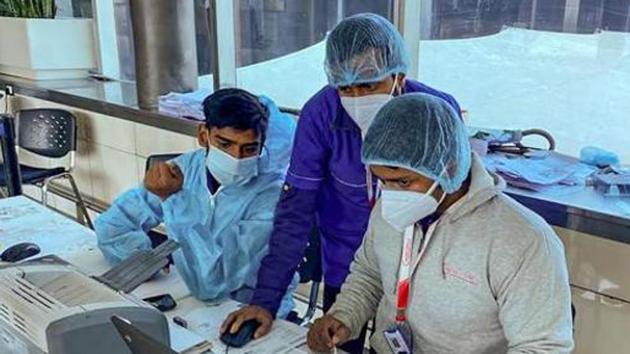6 UK returnees positive for new coronavirus mutation
All six of the infected people were now in isolation, the health ministry said in a statement, adding that their fellow travellers and close contacts were being traced.
Six cases of a more infectious strain of the coronavirus have been found in people who arrived from the UK, the government said on Tuesday, before top experts called for “extraordinary precautions” and senior officials indicated that a flight ban on the UK may be extended further to stop the spread of the mutation.

All six of the infected people were now in isolation, the health ministry said in a statement, adding that their fellow travellers and close contacts were being traced. At least one of them, 47-year-old Mary Winfred Ann Parrie, left the quarantine facility at Delhi airport after landing, and took a train to Rajahmundry in Andhra Pradesh before she was tracked down.
In all, the government has identified over 30,000 people who returned from UK to monitor for infections, but the effort has been complicated by many disclosing inaccurate contact details.
Also Read | States scramble to locate hundreds of UK returnees
“Data from UK confirms it is more transmissible. The variant is spreading there very rapidly and displacing other variants. This is very important globally because increased transmission will increase number of people infected and therefore number of severe cases. That’s why we should take extraordinary precautions,” said K VijayRaghavan, principal scientific advisor (PSA) to the government, while adding that the mutations seen in the variant do not appear to be such that will make current coronavirus vaccines ineffective.

Earlier in the day, the Union health ministry confirmed that genomic testing had found the new variant – at present known as VOC-202012/01 – in three samples at the National Institute of Mental Health and Neuro Sciences Hospital (Nimhans) Bengaluru, in two at the Centre for Cellular and Molecular Biology (CCMB) in Hyderabad and in one at the National Institute of Virology (NIV) Pune.
State officials later disclosed that three of these people were from Karnataka, and one each from Andhra Pradesh, Telangana and Uttar Pradesh. “All these persons have been kept in single room isolation at designated health care facilities by respective state governments and their close contacts have also been put under quarantine,” the Union ministry said.
First detected in London and Kent in mid-September, the variant was identified by UK authorities as a matter of concern on December 14. They later disclosed evidence that it appeared to be more transmissible, and was behind a spike in cases in the country’s capital as well as its south-east.
The variant has 23 changes in its genome, eight of which appear to influence the spike protein that the pathogen uses to latch on to host cells. Some of the other changes could make it more adept at infecting susceptible cells and possibly even evade some immune response, although detailed studies are underway.
In a preliminary assessment released late on Monday, UK scientists estimated that VOC-202012/01 did not lead to more deaths or hospitalisations but caused noticeably more secondary infections than the older variant.
“Vaccines will work against the new variants. They help develop wide range of neutralizing antibodies, so the whole repertoire of protective antibodies that is being created with the current set of vaccines is enough to tackle the current variations in the virus,” said VijayRaghavan.
A second top expert, Niti Aayog member (Health) VK Paul said significant mutations such as the new variant could impact infection control efforts. “This can destabilise systems in India as well as the world. This particular strain may have its own run, hence we have to be very careful,” he said, while also urging people to not let their guard down during New Year celebrations.
“Please remember it’s easy to suppress a new virus in the beginning because chain of transmission is smaller,” he added.
Both officials outlined several steps the government was taking to tackle the new threat. These include regular testing of a proportion of positive samples by a new consortium of government labs called Insacog and aggressive test-and-trace activities for those who returned from UK as well as any other individual who is found with the new strain.
Paul and VijayRaghavan were part of the government’s weekly briefing on the Covid-19 situation in the country. Union health secretary Rajesh Bhushan opened the briefing, the last for the year, by highlighting numbers that reflected the outbreak was receding in the country. “The cumulative positivity rate is now 6.02%, and over the last week, it has come down to 2.25%,” he said.
To protect these gains, the public will need to keep their guard up, the officials reiterated.
“The numbers are showing consistent decline, which is very reassuring. This is particularly since several nations are facing a devastating situation and that is also a very sobering moment for all of us,” said Paul, urging people not to hold large New Year parties since “they can become superspreading events”.
Experts said not much changes in terms of how the disease is handled, based on what is known about the UK variant. “It (new strain) was always likely. Nothing changes in terms of what we need to do. Usual precautions will work well for this variant as well,” said Dr Anurag Agrawal, director, CSIR- Institute of Genomics and Integrative Biology, New Delhi.






